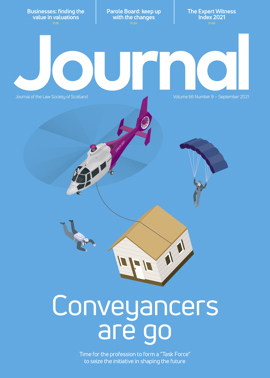Viewpoints: September 2021
The SLCC recently published a consultation on proposed changes to its rules. Our current rules were last updated in 2016, and we are required to keep them under review, so we felt an update was timely.
We specifically wanted to ensure that they reflect a digital focus in our operations and engagement with the profession. Our 2020-24 strategy committed us to moving to a digital first approach, and the experience of the last 18 months has only underlined the importance of this. The changes proposed therefore take account of the changing external landscape and norms, including technology, communication methods and administrative tools.
We also took the opportunity to respond to specific issues which have arisen in the last five years, where we identified that a change in the rules would be desirable to update or to clarify our processes and procedures, or to help us improve our efficiency.
The changes include:
- Removing unnecessary barriers to digital processes, including clarifying that, where appropriate, communications can be sent by electronic means, and that mediations, oral hearings and determination committees can take place using digital options.
- Allowing the SLCC to identify the nature of the information it requires from parties, and the form in which it would be most usefully provided, in order to assist a transition to use of digital formats, which will reduce delay and cost.
- Updating the section on confidentiality to ensure that the rules comply with current confidentiality and data processing requirements.
- Simplifying the requirements to make a complaint to remove unnecessary administrative barriers, to clarify when a complaint is deemed to have been registered by the SLCC, and the information required by the SLCC in order to register a complaint.
- Updating the section on time limits in recognition of the time elapsed since the last changes to time limits came into force, bringing all complaints in line with the three-year time limit. In practice, this only has implications for a small number of service complaints where the service was first instructed pre-April 2017. We have also clarified the circumstances in which the SLCC may accept a complaint that has not been made within the specified time limits.
- Clarifying the process for premature complaints, where the firm has not yet had an opportunity to try to resolve the issue, and the circumstances in which the SLCC may proceed to take action.
- Highlighting our focus on resolution, and the steps we may take to facilitate this.
- Make language gender neutral throughout.
Together, we believe these changes will ensure the SLCC is able to discharge its statutory duties as efficiently and effectively as possible. We’re look forward to hearing others’ views on these proposals over the next few months.
Full details on the proposed updates, and how to respond to the consultation can be viewed on the SLCC website. The consultation closes on 1 December 2021.
Vicky Crichton, director of Public Policy, Scottish Legal Complaints Commission
Regulars
Perspectives
Features
Briefings
- Civil court: Legacy of COVID
- Corporate: The enigma of economic duress
- Employment: where will work be found?
- Intellectual property: David v Goliath battle continues
- Agriculture: Crofting disputes: some first principles
- Sport: Arbitration – within the rules?
- Property: ADS: the hidden traps
- In-house: On harm, stakeholders and risk management
In practice
- Ask Ash: Colleague's chat is my privacy
- Lockdown no more
- The Word of Gold: The potency of passion
- Get interactive at the Law and Technology Conference
- Ten red flags for conveyancers
- The Eternal Optimist: So, what do you want to be?
- Commissary: the top 10 failings
- Mobility challenges – and the kindness of strangers
- When all is remote






